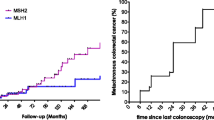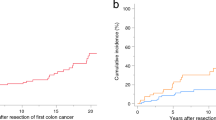Abstract
Background
The survival benefit of extensive colectomy is controversial in Lynch syndrome, and risk factors for metachronous colorectal cancer (CRC) after segmental colectomy are unclear.
Objective
The aim of this study was to investigate the survival outcome and risk of metachronous CRC after surgery in Lynch syndrome patients diagnosed with their first CRC.
Methods
Overall, 106 patients with Lynch syndrome who underwent surgery for CRC were included in the study. The demographics, genotype, clinicopathological characteristics of the index CRC, and follow-up data were reviewed from a single-institution Lynch syndrome database.
Results
Of 30 patients who underwent extensive surgery, no metachronous CRC was developed during a mean follow-up of 68.1 months. Of 76 patients who underwent segmental colectomy, 13 (17.1 %) developed metachronous CRC during a mean follow-up of 77.2 months. The cumulative risk of metachronous CRC was 8.4 % at 5 years and 20.4 % at 10 years after segmental colectomy. No difference in overall and CRC-specific survival was observed between segmental colectomy and extensive colectomy (p = 0.277 and p = 0.659, respectively). A 25 cm or longer resection of bowel decreased the risk of metachronous CRC after segmental colectomy compared with less extensive resection (hazard ratio 0.10, 95 % confidence interval 0.01–0.86). Annual surveillance colonoscopy did not decrease the risk of metachronous CRC compared with less frequent surveillance colonoscopy. Although not statistically significant, none of the MSH6 gene mutation carriers were diagnosed with metachronous CRC.
Conclusions
Although no survival benefit was identified, surgeons and patients might consider extensive colectomy to prevent metachronous CRC in Lynch syndrome patients regardless of their clinicopathological characteristics.


Similar content being viewed by others
References
Edwards BK, Ward E, Kohler BA, et al. Annual report to the nation on the status of cancer, 1975–2006, featuring colorectal cancer trends and impact of interventions (risk factors, screening, and treatment) to reduce future rates. Cancer. 2010;116:544–73.
Lynch HT, Lynch PM, Lanspa SJ, Snyder CL, Lynch JF, Boland CR. Review of the Lynch syndrome: history, molecular genetics, screening, differential diagnosis, and medicolegal ramifications. Clin Genet. 2009;76:1–18.
Bonadona V, Bonaiti B, Olschwang S, et al. Cancer risks associated with germline mutations in MLH1, MSH2, and MSH6 genes in Lynch syndrome. JAMA. 2011;305:2304–10.
Vasen HF, Moslein G, Alonso A, et al. Guidelines for the clinical management of Lynch syndrome (hereditary non-polyposis cancer). J Med Genet. 2007;44:353–62.
Giardiello FM, Allen JI, Axilbund JE, et al. Guidelines on genetic evaluation and management of Lynch syndrome: a consensus statement by the US Multi-society Task Force on colorectal cancer. Am J Gastroenterol. 2014;109:1159–79.
Vasen HF, Blanco I, Aktan-Collan K, et al. Revised guidelines for the clinical management of Lynch syndrome (HNPCC): recommendations by a group of European experts. Gut. 2013;62:812–23.
Parry S, Win AK, Parry B, et al. Metachronous colorectal cancer risk for mismatch repair gene mutation carriers: the advantage of more extensive colon surgery. Gut. 2011;60:950–7.
de Vos tot Nederveen Cappel WH, Buskens E, van Duijvendijk P, et al. Decision analysis in the surgical treatment of colorectal cancer due to a mismatch repair gene defect. Gut. 2003;52:1752–5.
Haanstra JF, de Vos Tot Nederveen Cappel WH, Gopie JP, et al. Quality of life after surgery for colon cancer in patients with Lynch syndrome: partial versus subtotal colectomy. Dis Colon Rectum. 2012;55:653–9.
Edge SB, Compton CC. The American Joint Committee on Cancer: the 7th edition of the AJCC cancer staging manual and the future of TNM. Ann Surg Oncol. 2010;17:1471–4.
Boland CR, Koi M, Chang DK, Carethers JM. The biochemical basis of microsatellite instability and abnormal immunohistochemistry and clinical behavior in Lynch syndrome: from bench to bedside. Fam Cancer. 2008;7:41–52.
Chang DK, Ricciardiello L, Goel A, Chang CL, Boland CR. Steady-state regulation of the human DNA mismatch repair system. J Biol Chem. 2000;275:29178.
de Vos tot Nederveen Cappel WH, Nagengast FM, Griffioen G, et al. Surveillance for hereditary nonpolyposis colorectal cancer: a long-term study on 114 families. Dis Colon Rectum. 2002;45:1588–94.
Engel C, Rahner N, Schulmann K, et al. Efficacy of annual colonoscopic surveillance in individuals with hereditary nonpolyposis colorectal cancer. Clin Gastroenterol Hepatol. 2010;8:174–82.
Stuckless S, Green JS, Morgenstern M, et al. Impact of colonoscopic screening in male and female Lynch syndrome carriers with an MSH2 mutation. Clin Genet. 2012;82:439–45.
Vasen HF, Abdirahman M, Brohet R, et al. One to two-year surveillance intervals reduce risk of colorectal cancer in families with Lynch syndrome. Gastroenterology. 2010;138:2300–6.
Win AK, Parry S, Parry B, et al. Risk of metachronous colon cancer following surgery for rectal cancer in mismatch repair gene mutation carriers. Ann Surg Oncol. 2013;20:1829–36.
Natarajan N, Watson P, Silva-Lopez E, Lynch HT. Comparison of extended colectomy and limited resection in patients with Lynch syndrome. Dis Colon Rectum. 2010;53:77–82.
Pylvanainen K, Lehtinen T, Kellokumpu I, Jarvinen H, Mecklin JP. Causes of death of mutation carriers in Finnish Lynch syndrome families. Fam Cancer. 2012;11:467–71.
Karlitz JJ, Hsieh MC, Liu Y, et al. Population-based Lynch syndrome screening by microsatellite instability in patients ≤50: prevalence, testing determinants, and result availability prior to colon surgery. Am J Gastroenterol. 2015;110:948–55.
Rubenstein JH, Enns R, Heidelbaugh J, Barkun A; Clinical Guidelines Committee. American Gastroenterological Association Institute guideline on the diagnosis and management of Lynch syndrome. Gastroenterology. 2015;149:777–82 (Quiz e16–7).
Disclosure
Tae Jun Kim, Eun Ran Kim, Sung Noh Hong, Young-Ho Kim, Jung Wook Huh, Yoon Ah Park, Yong Beom Cho, Seong Hyeon Yun, Hee Cheol Kim, Woo Yong Lee, Kiyoun Kim, Kyunga Kim, and Dong Kyung Chang have no conflicts of interest to declare.
Author information
Authors and Affiliations
Corresponding author
Electronic supplementary material
Below is the link to the electronic supplementary material.
Rights and permissions
About this article
Cite this article
Kim, T.J., Kim, E.R., Hong, S.N. et al. Survival Outcome and Risk of Metachronous Colorectal Cancer After Surgery in Lynch Syndrome. Ann Surg Oncol 24, 1085–1092 (2017). https://doi.org/10.1245/s10434-016-5633-1
Received:
Published:
Issue Date:
DOI: https://doi.org/10.1245/s10434-016-5633-1




